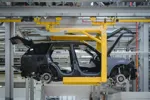The calendar year 2009 was one of the quietest on record for pure motor retail deals, a reflection of the general state of the economy and the lack of credit available to fund acquisitions.
There is, however, a growing belief that transactions are being more readily considered in 2010, with more attention paid to the longer term opportunity.
The first two months have already seen deals involving Jardine, Marshalls, Vertu and JCT 600 as buyers of family concerns.
Anecdotal evidence collated by Grant Thornton Automotive shows that sellers are more willing to do business, having seen an improved profit performance in 2009 and thus a belief that value has been restored to their shareholdings.
No-one expects a return to the halcyon days of five years ago, when purchasers were falling over themselves to secure quantity and pay well over the odds for anything remotely similar to their existing profile.
Nonetheless, the issues that plagued the industry from the summer of 2008, and the phenomenal decline in used vehicle values, have left a lasting impact on family concerns and made them re-appraise their long-term future in the industry.
When a family business decides it is time to move on, the dynamics become very personal.
Vendors typically seek out a deal with buyers who fit their profile and will look after the business long term. Equally, manufacturers have network plans which can be a big influence on ultimate purchasers.
Paul Burrows, of sector specialists Grant Thornton Automotive, said: “The level of activity has been especially low over the last 18 months.
“Those that have taken place reflect a more cautious environment, with both parties keen to see a real fit between their businesses. Whilst value for the outgoing family shareholders is key, of equal importance is the fate of employees who have often helped shape the success of the business over many years.”
Grant Thornton was adviser to the shareholders of Francis Motor Group, that disposed of its business to Marshall Motor Group.
Burrows said: “The shareholders of Francis were keen to see the business they had built up over many years transfer to someone who would be sympathetic to their approach to customer service.
“We were able to make an introduction to Marshalls’ chief executive Daksh Gupta and his team and explore a deal which allowed a smooth transfer and gave the retiring shareholders an acceptable exit route. One director will be staying on to continue the development of the business under Marshall's ownership.”
2009 saw very few headline-grabbing deals.
One of the largest happened through a sale of the Brooklyn Ford businesses to Robert Forrester's Vertu Plc.
This deal was another concluded by Grant Thornton Automotive.
Daniel Taylor, of Grant Thornton, who was leading the sale, sees some similarities with the Francis transaction: “There was a clear fit with Vertu and despite certain locations not forming part of the deal, the brand fit and opportunity were a key driver.”
Property plays a very big part of any transaction and this is likely to continue as more deals are concluded during 2010.
It has long been considered a key part of any transaction to acquire the freeholds as part of the deal.
This is now under serious challenge for a variety of reasons: 2009 saw a slump in values which exploded the myth that property values only ever move upwards - lending against property is harder than ever before and loan-to-value percentages have decreased - and investment commitments are significantly higher where the deal includes property.
Whilst there are businesses currently willing and able to invest, the lowest amount of funds that can be expended is a real attraction.
Burrows believes property is now more pivotal than ever: “We are seeing more enquiries about business opportunities but everyone has a limited budget. The property play is getting crucial and lawyers are now more likely to be focussed on lease and option terms than on the sale and purchase agreements themselves'
If 2010 does see an upturn in disposals, it will be because vendors can overcome property value issues and believe that selling their businesses to the right buyer maximises their return.
A return to the days of the mega goodwill numbers is extremely unlikely, not least because the historical buyer group is now very cash constrained. and simply cannot afford (nor can it automatically raise the funds) to do those deals.
The savvy vendor knows where to look for best fit and how to present the business. Buyers are out there - they are just not shouting from the rooftops anymore.













Login to comment
Comments
No comments have been made yet.